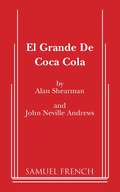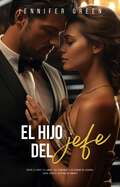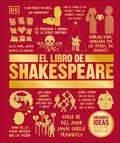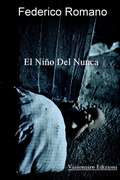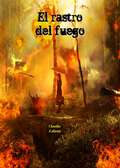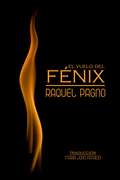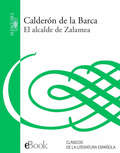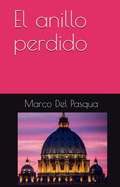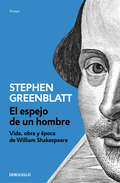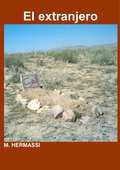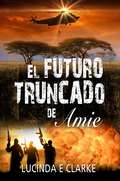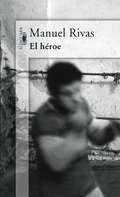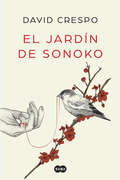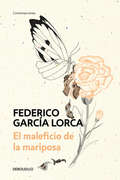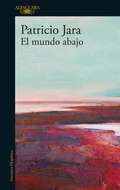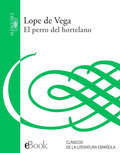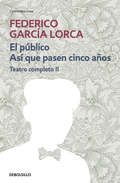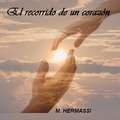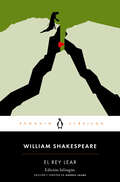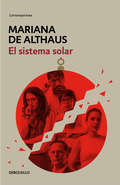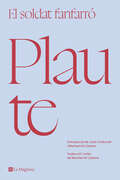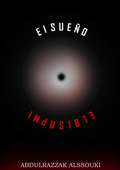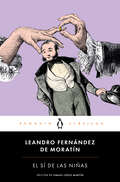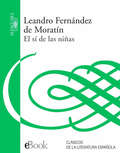- Table View
- List View
El Grande de Coca-Cola
by Alan ShearmanA simple show that is a laughable a minute and ridiculously wonderful! The action takes place in a terrible part of Trujillo, in a nightclub, which isn't too far from terrible itself. A local impresario, Senor Don Pepe Hernandez, has announced in the local newspapers that he is going to bring international cabaret to Trujillo. Eventually he succeeds, and we see the cabaret within the cabaret as it unfolds. A company known as the "Low Moan Spectacular' causes all the laughs, as conjuring tricks don't work, people trip up, a blind American folk singer falls off the stage, chorus girls collide, etc.
El Hijo del Jefe
by Jennifer GreenMadrid 1959. Ignacio Gómez, hijo del Jefe Fernando Gómez, l'omonimo más temido di toda la Capitale, assiema vivido in un costante conflitto con su padre, quieto buscó per todos los medios de mantenerlo alejado de sus turbios negocios. Pero el joven, haremriento de dinero y mujeres hermosas, logró en pocos años, levantar un imperio y superar lentamente el negocio de Fernando. In un attimo della parte della famiglia Álvarez, su padre muere. Ignacio decide vendetta su muerte, accetta la hija, la joven Helena Álvarez, registra conquistando in poco tempo su corazón e haciéndole creer intentará quale sia la cosa più bella. La chica ignora los planes del joven, è innamorata e se di fatto è completamente per i suoi sentimenti hacia él. Pero para Ignacio Gómez, le coste di tutti gli aerei e gli aeroplani che ti obbligano a ceneri e le parole di guerra. Qual è il tuo golpea nel cuore di Ignacio e cambia le carte come è finita qui? Y, ¿si pierde a Helena, significa perderse a sí mismo? Entre el odio y el amor, the venganza y un camino de canang, ¿Cuál será el destino de ambos?
El Libro de Shakespeare (DK Big Ideas)
by DKEl libro de Shakespeare trae las obras de William Shakespeare a la vida con fotografías a todo color, imágenes, nubes de ideas, cronologías y citas que ayudarán al lector a comprender el contexto de las piezas y poemas de Shakespeare.Desde las obras más famosas de Shakespeare, como Romeo y Julieta y Julio César, hasta piezas menos representadas, como El rey Juan y Enrique VIII, cada obra del canon shakespeariano está recogida en esta completa guía, junto a sus principales poemas y más aclamados sonetos.En El libro de Shakespeare cada obra incluye una guía visual cronológica de la trama para que el lector pueda situarse en caso de perderse en el lenguaje de Shakespeare. Las guías de personajes proveen una referencia útil para lectores ocasionales y un valioso recurso para estudiantes y para aquellos que van a ver las obras representadas.Repleto de gráficas y explicaciones de las tramas, además de una introducción a la vida y la época de Shakespeare, El libro de Shakespeare es la guía definitiva para entender sus obras completas.Edición también disponible en inglés.El libro de Shakespeare brings the work of William Shakespeare to life with full-color photography, images, idea webs, timelines, and quotes that help you understand the context n of Shakespeare's plays and poems.From Shakespeare's most-famous plays, such as Romeo and Juliet and Julius Caesar, to less-frequently performed works such as King John and Henry VIII, every play of the Shakespearean canon is collected in this comprehensive guide, along with his major poems and best-loved sonnets.In El libro de Shakespeare each play includes an at-a-glance guide to story chronology, so you can easily get back on track if you get lost in Shakespeare's language. Character guides provide a handy reference for casual readers and an invaluable resource for playgoers, and students writing reports on Shakespeare.Packed with infographics and explanations of plots and including an introduction to Shakespeare's life and times, El libro de Shakespeare is the ultimate guide to understanding the work of William Shakespeare.Also available in English edition.
El Niño del Nunca
by Federico RomanoEl gran viaje que hará Frederik Jonson en el reino celestial abrirá el camino hacia el origen y la verdad de su vida. A través de una variada galería de personajes y situaciones: fauna humana de víctimas indefensas o verdugos implacables, asesinos siniestros o inocentes, hombres devotos de los excesos y perdiciones o inocentes inconscientes, se logrará una extraordinaria epifanía de grandeza: la revelación del destino de Frederik y el pasaje escatológico. de un "niño del nunca" a un hombre de una existencia generosa hasta el heroísmo.
El Rastro del Fuego: de Notre Dame a la Mole Antonelliana.
by Claudio CalzoniEl Rastro del Fuego de Claudio Calzoni El Rastro del Fuego: de Notre Dame a la Mole Antonelliana. Hay una estela de fuego detrás de la muerte de tantas personas, la destrucción de monumentos que custodian la memoria de la Humanidad y una reliquia, la más importante que la cristiandad ha conservado durante milenios. El juego de ajedrez entre el Bien y el Mal ha comenzado. Los jugadores mueven sus piezas. Ganará el que ponga en jaque al Rey. No es fácil de encontrar pero el rastro del Fuego está en el aire...
El Vuelo del Fénix
by Raquel Pagno María João Patricio MartinhoDe repente, Natalia se enfrenta a una nueva realidad: un aneurisma cerebral, que puede romperse en cualquier momento. Frente a esa nueva realidad, descubre también una renovada fuerza de voluntad, antes aletargada, y el deseo de encontrar al hombre que la atormenta todas las noches en sus pesadillas. Para ello, contará íntegramente con la ayuda de su amigo Andrew, que la anima a iniciar una terapia de regresión. Durante las consultas, Natalia se encuentra con el misterioso hombre de sus sueños y presencia su muerte en repetidas ocasiones. Andrew la acompaña en un viaje rumbo a lo desconocido. Una vez encontrado el inalcanzable hombre de sus sueños,en ésta vida un temerario y apasionado piloto acrobático, sólo les queda encontrar la manera de llamar su atención y conseguir que escuche el relato de Natalia. Ella tiene una idea clara: en esta vida, le salvará de la muerte precoz que le aguarda.
El alcalde de Zalamea
by Pedro Calderón de la BarcaEl alcalde de Zalamea está universalmente considerada como una de las joyas del teatro español, y por muchos como la más excelente y preciosa del teatro de Calderón de la Barca.Isabel cuenta a su padre, alcalde de Zalamea, que ha sido raptada y violada por el capitán Álvaro de Ataide, al que ofrecieron hospedaje cuando llegó al pueblo la compañía de soldados en avance hacia Portugal. El alcalde, don Pedro Crespo, no acata más justicia que la propia y condena el atropello cometido contra su hija, ya que #Al rey, la hacienda y la vida / se ha de dar, pero el honor/ es patrimonio del alma, / y el alma sólo es de Dios#.
El anillo perdido
by Marco Del PasquaAño 1856, durante las labores de mantenimiento del tejado de un monasterio romano se encuentra un pergamino que contiene un mensaje escrito por un hijo a su madre que se remonta a 1646 y que se refiere a un anillo de Pedro robado y escondido en un pueblo toscano. El teniente Luigi De Santis, de la Gendarmería Pontificia, viene encargado de redactar un informe sobre el hallazgo e, inmediatamente, despierta el interés de las altas jerarquías de la iglesia ya que podría tratarse de una supuesta reliquia del apóstol Pedro, que los papas buscaban en secreto desde hacía siglos. En los archivos se descubre documentos que refieren de un extraño robo de un anillo en 1565 durante la construcción de la Basílica de San Pedro. Objeto que luego, misteriosamente, desaparece y reaparece, una veintena de años más tarde, luego del encuentro casual entre el famoso abogado romano, de origen toscano, Alessandro Falciani y una chica de origen humilde, Gigetta, que está en posesión de este, y está intentando, por todos los medios, venderlo. El propio Papa Pío IX, a través del Secretario de Estado, Cardenal Antonelli, llevará a cabo una laboriosa investigación, pero el pontífice se encuentra en grandes dificultades, ya que los Estados Pontificios están amenazado por el expansionismo de los Saboya y, desde hace tiempo, circulan teorías filosóficas que podrían socavar la credibilidad misma de la iglesia católica. El cardenal Antonelli tiene una hija secreta, Laura, que vive bajo la tutela del gran maestro de la masonería romana y que se enamora del teniente De Santis. Amor que será correspondido por el oficial, pero al que se opone su verdadero padre, mientras tanto las pesquisas se verán obstaculizadas. Una novela cautivadora en la que se entrecruzan apasionadas historias de amor y violentos choques entre grandes poderes.
El espejo de un hombre: Vida, obra y época de William Shakespeare
by Stephen GreenblattLa biografía definitiva del dramaturgo más importante de todos los tiempos. Son muchos los que consideran a William Shakespeare el mejor escritor de todos los tiempos por su ingenio, la universalidad de sus conflictos, la profundidad de los personajes, la revolución sin precedentes que supuso su obra... Pocos autores han marcado un antes y un después de forma tan incuestionable. Sin embargo, casi nada se sabe con certeza de su vida. Durante siglos se han sucedido especulaciones de todo tipo, sin que ninguna arrojara luz convincente sobre el gran misterio. Stephen Greenblatt, uno de los mayores expertos en Shakespeare, propone aquí una original hipótesis arropándose en la obra misma del dramaturgo y en la de sus coetáneos. De un modo similar a la manera en que Hamlet observaba la efigie de su padre («Una combinación y una forma sin duda / en las que cada dios parece / haber puesto su sello / para mostrar al mundo el espejo de un hombre»), así mismo es este libro mucho más que una biografía. También es un riguroso estudio de los escritos de Shakespeare y, sobre todo, un magnífico retrato de la Inglaterra isabelina. Reseñas:«Asombrosamente bueno. Es el libro más inteligente y sofisticado, y también el estudio más colosalmente apasionado que he leído jamás sobre la vida y obra de Shakespeare.»Adam Gopnik, The New Yorker «Un libro de lectura compulsiva, original como pocos. Greenblatt ha conducido la investigación más empática posible sobre el modo en que las experiencias vitales de Shakespeare penetraron en sus obras.»Stanley Wells «Tan absorbente, lúcido y coherente que su llegada no es solo bienvenida sino motivo de celebración.»Dan Cryer, Newsday «Elocuentemente escrito, ricamente detallado y revelador desde el primero hasta el último capítulo [...]. Es inevitable que logre un lugar entre los estudios esenciales de losmejoresescritores.»William E. Cain, Boston Sunday Globe «Una magnífica hazaña.»Denis Donoghue «Una deslumbrante e ingeniosa biografía.»Richard Lacayo, Time «Greenblatt evoca con concisión y vívidamente el mundo isabelino.»Mitchiko Kakutami, The New York Times
El extranjero
by M. HermassiEl número exacto de víctimas del Muro de Berlín es motivo de controversia. Y es que en la actualidad, la comprobación de este dato no es tarea fácil, ya que la RDA siempre ha ocultado el número de víctimas en ese punto concreto. Han sido cientos de familias truncadas, cientos de historias rotas por un muro de hormigón. El muro de la vergüenza que jamás debería haberse construido.
El futuro truncado de Amie
by Eva Romero Lucinda E ClarkeAmie regresa a su amada África y a su vida habitual, pero sus enemigos no la han perdonado, ni olvidado. Están decididos a vengarse y recuperar su honor. Lo acontecido una noche lo cambia todo, dejándola sin casa, ni amigos, ni nombre, ni futuro. De repente, ya no existe y aquellos que la controlan se lo dejan bien claro; debe obedecer o morir. Futuro Truncado es el tercer libro de la saga Amie, un bestseller que ha recibido múltiples premios internacionales a ambos lados del Atlántico. De ser un ama de casa ingenua y recientemente casada, Amie pasa a enfrentarse a retos que cambian sus creencias y comportamiento más allá de lo reconocible. Una aventura de acción trepidante, que te mantiene pegada a sus páginas y que está ambientada en el África salvaje de la actualidad.
El héroe
by Manuel RivasLa primera pieza teatral de Manuel Rivas. La «guerra secreta» de Sidi Ifni fue la última guerra colonial española. Denominada también en el ámbito militar como la de los Cien Días, duró más tiempo, con combates entre noviembre de 1957 y el 30 junio de 1958. Murieron al menos trescientos soldados españoles y más de quinientos resultaron heridos graves. El número de víctimas entre los nativos y guerrilleros tuvo que ser muy alta, pero nunca se ha dado una cifra oficial. En España no hubo apenas noticia de esta tragedia bélica. El franquismo extremó su régimen de censura para mantenerla oculta. Fue una guerra cruel y secreta. Arturo Piñeiro, alias Robinson, alias Caronte, ex boxeador y legionario, es el protagonista de El héroe. Participa en los combates del Sidi Ifni y a su regreso a España espera un gran recibimiento, pero el guerrero se encuentra con una población que ignorasu guerra. El choque de Robinson hace que se tambalee su visión del mundo. España es también tierra conquistada por la dictadura, un estado de guerra o excepción permanente, donde gobierna un Caudillo «por la gracia de Dios». El héroe trata de la llamada «pena de Marte», de la angustia del guerrero ante el engaño de la guerra. En un mundo de cárceles y guerras «secretas», de nuevo culto al guerrero, la historia del legionario Robinson nos sitúa en un escenario de la historia como un «presente recordado».
El jardín de Sonoko
by David CrespoUna historia de amor poco convencional. Una fábula moderna ambientada en un Japón mágico que nos enseña que hay seres abocados a estar juntos pase lo que pase. Kaoru, un vendedor de zapatos de Kioto, se sirve de la maniática regularidad con que rige su vida como escudo protector frente al mundo, pero sobre todo frente a sus propios recuerdos, los que le llevaron a pasar cinco años aislado en una habitación. Y todo funciona según lo previsto hasta que su compañera de trabajo, Sonoko, inesperadamente le invita a salir. A la mañana siguiente, y por primera vez en tres años, Kaoru, olvidará tomar dos de sus cinco tazas de té, levísimo primer síntoma de un imparable efecto mariposa que le obligará a desenroscarse de forma traumática para ir en busca de su destino, ese invisible hilo rojo que como reza la leyenda, conecta a aquellos que están destinados a encontrarse, sin importar tiempo, lugar o circunstancias.
El maleficio de la mariposa
by Federico García LorcaConmemoramos el centenario del estreno de la primera obra de teatro de Federico García Lorca, El maleficio de la mariposa. El maleficio de la mariposa es una preciosa fábula en la que el poeta granadino nos pone en la piel de una cucaracha que sufre de uno de los peores males en la poesía: el amor imposible. A través de este curioso y original juego modernista Lorca nos habla de impotencia, frustración, aspiraciones truncadas y sentimientos no correspondidos. La presente edición, que está a cargo de Víctor Fernández, cuya mirada aporta frescura e ingenio, incluye Del amor. Teatro de animales, que antecede el estreno de la obra, y uno de los diálogos escritos en la Residencia de Estudiantes en aquella misma época. Reseña:«De todos los seres vivos que he conocido, Federico es el primero. No hablo ni de su teatro ni de su poesía, hablo de él. La obra maestra era él.»Luis Buñuel
El mundo abajo
by Patricio JaraUna de las voces más interesantes de la narrativa chilena contemporánea. En estos siete espléndidos cuentos, Patricio Jara nos sumerge en los mundos subterráneos de hombres y mujeres que, por diversas razones, son enfrentados a la tragedia. Entre el desierto de Atacama y la periferia de la gran ciudad, los relatos se conectan y nos permiten ingresar al universo psicológico de quienes habitan estos paisajes. Una piloto que diseña las rutas de los aviones, un buzo profesional que no quiere volver al mar después de un accidente y una pareja de investigadores en la desembocadura del río Loa son algunos de los personajes que difuminan la línea entre lo correcto e incorrecto, y que demuestran que el paso de lo cotidiano a lo siniestro es estrecho. Un conjunto de relatos donde lo temible se abre paso con la fuerza del oleaje.
El perro del hortelano (Teatro Ser. #Vol. 14)
by Lope de VegaLlamada también La condesa de Belflor, es un ejemplo de comedia de enredo y costumbres, escrita hacia 1618. Diana, la condesa, está enamorada de su secretario Teodoro, que ama a Marcela, aunque está dispuesto a prestar oídos a su señora. Pero Diana se encuentra en un dilema: ni quiere casarse con él porque no pertenece a su clase, ni le da el consentimiento para que se case con Marcela. Sin embargo, cuando se entera de que Teodoro puede ser descendiente del conde Ludovico, acaban sus dudas.
El público | Así que pasen cien años (Teatro completo #2)
by Federico García LorcaEl público | Así que pasen cinco años es el quinto volumen de la Biblioteca Federico García Lorca y el segundo que reúne su «Teatro completo». En este libro se ofrecen al lector clásicos lorquianos como Amor de don Perlimplín, así como aquello que se dio en llamar el «teatro irrepresentable»: El público y Así que pasen cinco años. Asimismo, se incluyen conferencias y charlas dadas por el poeta alrededor de sus textos, lo que permite una aproximación aún más personal a su inmensa obra. La edición y los prólogos, a cargo de Miguel García-Posada, permiten al lector acercarse a la complejidad de su obra y disfrutar, a lo largo de los siete volúmenes que componen esta Biblioteca Federico García Lorca, de uno de los autores españoles más relevantes del siglo XX. Salvador Dalí dijo...«El sentido trágico de la vida que poesía Lorca se distinguía por la misma constante trágica por que se distingue el destino de todo el pueblo español.» --------------------------------------------------------------------------BIBLIOTECA FEDERICO GARCÍA LORCA Poesía competa:1. Libro de poemas | Primeras canciones | Canciones2. Romancero gitano | Poema del cante jondo3. Poeta en Nueva York | Sonetos Teatro completo:4. La zapatera prodigiosa | Mariana Pineda5. El público | Así que pasen cinco años6. Bodas de sangre | Yerma7. La casa de Bernarda Alba | Doña Rosita la soltera--------------------------------------------------------------------------
El recorrido de un corazón
by M. HermassiEl recorrido de un corazón es la historia de un hombre de 34 años quien fue sometido a un trasplante de corazón. Por rumores se entera de que el corazón que recibió pertenece a una joven que murió en un accidente automovilístico. La historia hace que se tome las cosas muy en serio, decide hacer su investigación, llegar a la chica en cuestión, y conocer su historia. Atrapado en su propio juego, esta historia se convierte con el tiempo en una obsesión para él. A pesar del secreto para mantener el anonimato de los donantes de órganos, se las arregla por medios sutiles, y una paciencia sin límite, llegar a ella, para conocer a sus padres. Encuentra el cementerio donde está enterrada, con su foto y su nombre. Se llama Irene, 22 años. Una historia irreal nace entre él y la difunta, un amor imposible toma forma. Comienza a amar a aquella cuyo corazón sigue latiendo en su pecho. Las cosas se complican cuando se entera de que tiene una hermana gemela que vive en algún lugar de África, o trabaja como enfermera en una ONG. Decide ocultarlo todo, e ir en busca de la que se parece como dos gotas de agua a Irene. Un amor teñido de drama y pasión, un amor poderoso y frágil, por estos ingredientes insólitos, toma forma de una aventura llena de tormentas y buen tiempo.
El rey Lear
by William ShakespeareLa tragedia del Rey Lear fue escrita probablemente entre 1605 y 1606. Su protagonista es un anciano monarca que, antes de dividir el reino entre sus tres hijas, les pide que halaguen su vanidad. Mientras Regan y Goneril lo complacen, la tercera, Cordelia, rechaza obrar con hipocresía. Tal actitud desata la hybris del rey y lo lleva a destruir la felicidad de su familia, de sus súbditos y la suya propia. La historia secundaria, la del Duque de Gloucester y sus hijos Edmundo y Edgardo, pone en escena un conflicto similar al principal, Tanto Lear como Gloucester llegarán a la verdad sólo al término de una serie de padecimientos. Con un lenguaje coherente, poético y vital, los personajes de las obras de Shakespeare nos hablan desde lo más hondo de su situación existencial: ciegos de amor, consumiéndose de celos, agitados por la duda, devorados por la ambición y el remordimiento, debatiéndose entre el bien y el mal, ebrios de fanfarronería, y, lo que resulta más inquietante, sin ninguna finalidad moral.
El rey Lear
by William ShakespeareLos mejores libros jamás escritos. «Sé cuándo alguien ha muertoy cuándo vive:tan muerta está como la tierra.» El rey Lear es el mayor logro de Shakespeare y una de las obras más radicales que ha dado la literatura occidental. Lear es un viejo rey que decide de pronto dividir su reino entre sus tres hijas pidiéndoles a cambio que les expresen su grado de amor. Goneril y Regan se deshacen hipócritamente en halagos y Cordelia, la pequeña y favorita, contesta que no dirá nada, una respuesta que desata la furia de su padre y el principio de un viaje hasta lo más hondo de la condición humana. Desnudo ante el mundo, Lear se verá despojado de sus dominios, de su autoridad, de su cordura y de lo que más ha querido. Nada hay en esta obra que no sea interrogado. Cuando se cumplen cuatrocientos años de la muerte de Shakespeare, publicamos una nueva edición y traducción de esta magna tragedia al cuidado del editor y crítico Andreu Jaume.
El sistema solar
by Maríana De AlthausUna obra de teatro de Mariana de Althaus llevada ahora al cine. Una obra de teatro donde orbita un orden conflictivo y precario, y a pesar de sus tensiones se mantienen en delicado equilibrio.
El soldat fanfarró
by PlauteEl soldat pagat de sí mateix i l’esclau murri còmplice del seu amo, protagonistes d’aquesta obra, són dos dels caràcters de Plaute amb més influència en la comèdia europea de tots els temps. A Efes, Pirgopolinices, soldat fanfarró i vanitós, ha segrestat l’amant de Plèusicles, Filocomàsia. Per alliberar-la, Palestrió, esclau de Plèusicles, li para una trampa: fa veure que la cortesana Acrotelèucia, que fingeix ser l’esposa del veí ancià del soldat, Periplectomen, se n’ha enamorat perdudament de Pirgopolinices. Aquest, convençut d’haver fet una bona conquesta, es desempallega de Filocomàsia. Mentrestant, Periplectomen, fingint indignació per la gosadia del soldat, li prepara una bona pallissa.
El sueño imposible
by Abdulrazzak Alsssoukiel sueño imposible es una novela corta de fantasía romántica que habla sobre un sueño que le sucedió a un chaval desde sus primeros años, el sueño se hizo cada vez más real con el tiempo.
El sí de las niñas
by Leandro Fernández de MoratínLa obra maestra de Leandro Fernández de Moratín y una de las piezas de teatro más importantes de la Ilustración española. El sí de las niñas, la más conocida de las comedias neoclásicas, narra, con estricta sujeción a los principios de unidad de acción, espacio y tiempo, la disolución del compromiso de matrimonio entre don Diego y Francisca, que está enamorada de un tercero. Crítica con la educación que se daba a las jóvenes en los conventos y con la costumbre de los matrimonios arreglados, esta comedia es, en su ligereza, un verdadero compendio del pensamiento ilustrado.
El sí de las niñas
by Leandro Fernández de MoratínDoña Irene piensa casar a su hija con don Diego, un rico solterón, pero el pretendiente tiene un sobrino -Carlos-, del que Paquita se enamora desbaratando los planes de su madre. La obra -que fue el mayor éxito teatral de su tiempo- reivindica el derecho a casarse por amor en lugar de por conveniencia, como todavía era frecuente a comienzos del siglo XIX. Ataca las costumbres e hipocresías de la época y critica la educación recibida por las mujeres.
